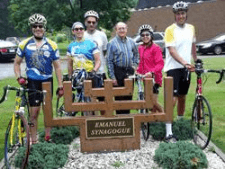I biked 50 miles last Sunday, but that is not big news. The truly wonderful story is that shul members, riders, some congregational rabbis and cantors, and members of the Tikvah Voc Ed Program came out to support the Tour de Shuls bike rides in both Boston, MA and West Hartford, CT. The Federation of Jewish Mens’ Clubs, long times supporters of the Tikvah Program at Camp Ramah in New England, created this cleverly named ride three years ago; the ride is fun for bike riders of all ages (nearly 150 participated this year), and it brings together congregants who cheer and provide snacks and drinks to the riders. Proceeds of the ride benefit our Tikvah Program, which is celebrating its 40th anniversary on July 11th. Thanks to all who organized the ride, participated, cheered and donated (it’s still not too late! http://www.tourdeshuls.org)
Tour de Shuls… Connecticut style
Helping to give special needs kids a fun summer
By Cindy Mindell

For several years, the New England Region of the Federation of Jewish Men’s Clubs has raised money to support the Tikvah Program at Camp Ramah in New England, one of the first summer programs for Jewish campers with special needs.
Now in its 40th year, the pioneering Tikvah has inspired many off-shoots, both within the Camp Ramah system and elsewhere. The program offers three tracks: a full Ramah camping experience for 13- to 18-year-olds; vocational training, socialization, and group-living experience for graduates of the camping program; and inclusion of younger campers in typical Ramah bunks. Many vocational-training graduates have been hired to operate the on-site guesthouse.
Three years ago, the men’s club at Temple Aliyah in Needham, Mass. decided to take its fundraising efforts further. Several members, all avid cyclists, had participated in charity bike-a-thons and saw the model as a way to bring together congregations throughout the area for community-building and tikkun olam.
Tour de Shuls debuted in 2008, involving synagogues throughout the Boston suburbs. The event raised more than $5,000 for Tikvah, says program director Howard Blas, who lives in Woodbridge.
The 2009 Tour de Shuls did the same. That’s when David Diamond of West Hartford learned about the benefit bike ride. Diamond, then president of the men’s club of Beth El Temple in West Hartford, was attending a regional Jewish men’s retreat at Camp Ramah, “and I thought Tour de Shuls would be a phenomenal thing for our community,” he says. Diamond shared the idea with fellow Beth El congregant Bruce Stanger of West Hartford, who serves on the Camp Ramah of New England board and as co-chair of the Israel Ride, an annual 350-mile Jerusalem-to-Eilat bike ride. He has also ridden in the Massachusetts Tour de Shuls. By December, a committee was in place, co-chaired by Diamond and Lisa Sue Levin, also of West Hartford.
“I’m passionate about biking and tikkun olam,” says Levin, a past co-chairof Beth El’s mitzvah day. “I’m excited and honored to co-chair the first Tour de Shuls in Connecticut.”
Levin recently attended the bar mitzvah of a boy with autism, held at a summer camp. “Reading the Torah in the woods in an outdoor sanctuary made me think about our event,” she says, “and how important it is to provide special-needs kids with the opportunity to go to camp, learn about their Jewish background, and help establish their Jewish identity.”
The Connecticut event is sponsored by the Connecticut Valley Region of the Federation of Jewish Men’s Clubs, with nine area synagogues providing volunteers and supplies.
Tour de Shuls kicks off at 8am at The Emanuel Synagogue, 160 Mohegan Drive in West Hartford with a pre-ride breakfast. Cyclists of all levels are welcome. There are four rides of varying lengths available. All routes end at The Emanuel with a community celebration including music and light refreshments. Snacks and water will be provided along the routes. Pre-registrants will receive a t-shirt and a water bottle. For more information and to register: www.tourdeshuls.org, or David Diamond at daviddiamond2@comcast.net / (860) 673-6885 or Lisa Levin at lisasuelevin@aol.com / (860) 675-7400.
From Camp To Kazakhstan to Central Park: The Strong Bond of Jewish Camping
As you can imagine, the days leading up to 9 weeks of camp (staff week plus eight weeks) are exciting and action packed. I am entering my 10th year as the director of the 40 year old Tikvah Program, which offers overnight camping opportunities for nearly 50 children and young adults with a wide range of special needs. Our winter office is based in Boston and the camp itself is in Palmer, Massachusetts; and I have the distinction of being the only year round staff member who doesn’t work out of the camp office. For me, there is no period of packing up the office and moving to Palmer. So, when the office is in transition, my computer is still on and with me. And I receive many calls from Tikvah (and even non-Tikvah) families seeking information from an actual person about bus departures, luggage tags, etc. But, for the most part, I am sitting at home, working hard to put the finishing touches on the Tikvah Program and the Inclusion Programs for Kayitz, 2010. It is crunch time!
This week alone, I met with our rosh edah, sent out Tikvah bunking, interviewed an out of state Tikvah family (at an NYC kosher bagel and pizza store!), spoke with counselors, a newspaper reporter and a funder, did tons of paperwork, and wrote and answered hundreds of emails. You know it is countdown time when emails sent to my camp colleagues the director, assistant director, programming director, business manager and development director are routinely answered even when sent at 11 pm!
Yet, sometimes the best way to prepare for camp is to take a break from camp!
Today, it is a hot, sunny day in Manhattan. After a few hours of doing camp work and staring out at the beautiful weather, I decided to get away from camp by getting on my bike and heading over to Central Park. The park is closed to car traffic starting at 10 am. So, at 11:30 or so, I put on my biking clothes, grabbed my helmut, pumped up my tires and hit the park. The loop is six miles, and the runner and biker lanes were packed with others who had the same idea. The park was packed with school kids having picnics, color wars and attending the marionette show. And there were readers, tennis players and sunbathers galore.
I was at peace, almost in a dream state, as I neared Tavern on the Green on the West Side, in the 60s. All of a sudden, I thought I saw a t-shirt, identical to one I have and actually wear quite often a gray staff t-shirt with RAMAH in big orange letters on the front, and Tzevet (Staff) 2008 on the back. But I was relaxed and pedaling 22 miles an hour. Couldn’t be. Why would a pedicab (bike cab) driver in Central Park in New York City be wearing a shirt from my camp?! My curiosity got the better of me. I slowed and stopped in front of the cab and asked the driver where he got the shirt. Well, Ilya, the pedicab driver, was Ilya the kitchen worker two years ago at Camp Ramah in New England! Where are you from? I asked. Kazakhstan, he replied. He still eyed me a bit suspiciously. I asked, Oh, you worked with Meital and Randy? He smiled. I invited him to come visit. I reached in to my pouch and forked over the one piece of identification I had on my Camp Ramah in New England-Tikvah Director business card. Call me if I can be of help, I said. His smile got bigger. I got back on my bike and went back to dreaming this time of bike rides, in just a few weeks, with my many camp friends including my kitchen staff friends–to Quabbin Reservoir.
A Refreshing Taste of Palmer (and Kazakhstan) in Central Park
As you can imagine, the days leading up to camp are exciting and action packed. For the Tikvah Director, who doesn’t work out of the camp office, there is no period of packing up the office and moving to Palmer. So, when the office is in transition, my computer is still on and with me. And I receive many calls from Tikvah (and even non-Tikvah) families seeking information from a person about bus departures, luggage tags, etc. But, for the most part, I am putting finishing touches on the Tikvah Program and the Inclusion Programs for Kayitz, 2010. It is crunch time!
This week alone, I met with Ariella, our rosh edah, sent out Tikvah bunking, interviewed an out of state Tikvah family (at an NYC kosher bagel and pizza store!), spoke with counselors, a newspaper reporter and a funder, did tons of paper work, and wrote and answered hundreds of emails. You know it is countdown time when emails sent to my camp colleagues Ed, Davey, Josh, Rhonda, Hagit, Erica, etc–are returned instantly even at 11 pm!



